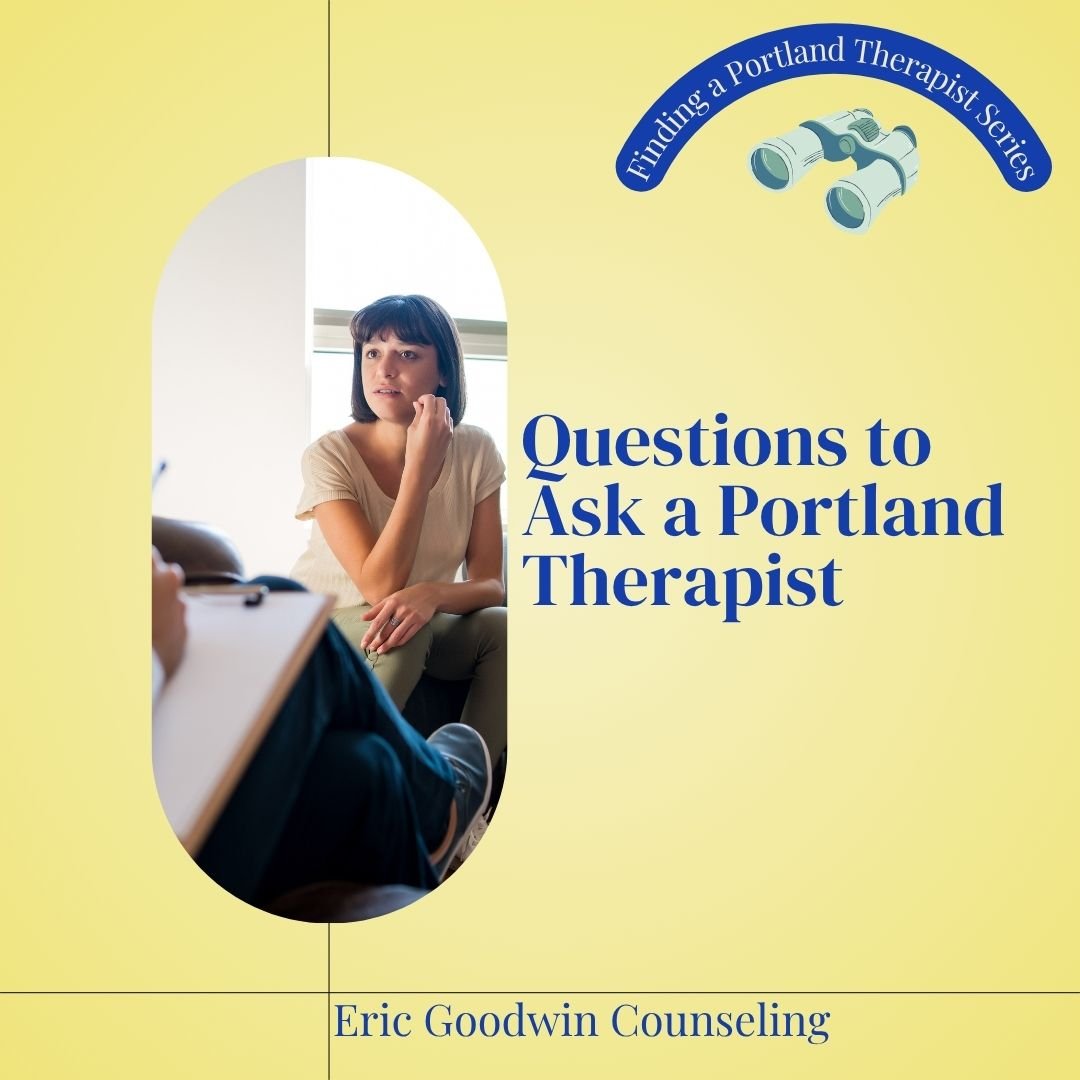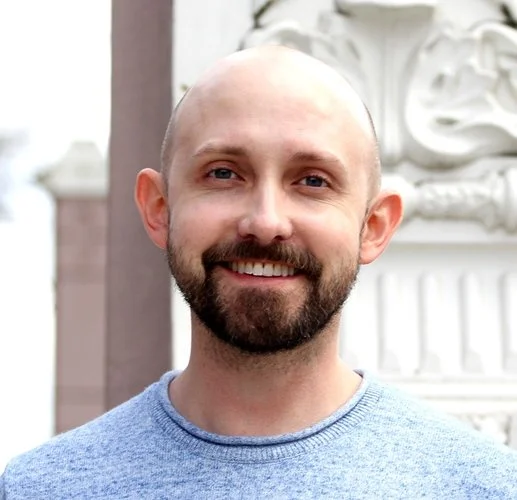Questions to Ask a Portland Therapist
Finding the right Portland therapist can feel like stepping into a maze. Whether this is your very first time looking for help or you’ve been in therapy before and are hoping for a better fit this time, the search itself can feel like a weight on your shoulders. In a city as large and diverse as Portland, there are so many choices. It’s easy to wonder: Where do I even start? And how do I know who will really get me?
Hi, I’m Eric Goodwin, and I help thoughtful, caring people who are navigating anxiety, self-doubt, and identity questions find clarity and a deeper sense of self through therapy. Over the years, I’ve seen that the questions you ask a therapist in Portland, and how you feel when you ask them, can be just as important as any credential or training. Let’s slow this process down so you can feel a little more grounded as you take this step.
Why Choosing the Right Therapist Matters
Therapy isn’t just about techniques or tools. It’s about connection. The right therapist can make it feel safer to share the things you’ve never said out loud, to experiment with being more honest, and to explore the parts of yourself that have been hidden for a long time.
If you’ve never done therapy before, it can feel like stepping into a completely new world. And if you’ve been in therapy for years, you know the difference a good fit can make, and you might be more tuned in to what did or didn’t work before. In either case, being intentional about the questions you ask can make the search feel more like a collaboration and less like a gamble.
What Should You Ask a Portland Therapist?
1. Have you worked with people who share my concerns?
Whether you’re reaching out for support with anxiety, navigating a big transition, working through the impact of past trauma, or exploring your identity, it’s important to know if a therapist has walked alongside others in similar situations. If this is your first experience with psychotherapy in Portland, asking about their background can help you feel more confident that you’re not starting from scratch together.
If you’ve been in therapy before, you might already know the kind of support that feels helpful and the kind that doesn’t. Sharing this with your new therapist can guide the conversation toward your specific needs.
2. How would you describe your approach to therapy?
Therapists have different ways of working. Some are structured and goal-oriented, while others work more relationally, following the flow of each session. There’s no one “right” way, it’s about what works for you.
For first-time clients, you might ask, “What might a session look like?” or “What will we focus on in the beginning?” For those with more experience, you might say, “I’ve done a lot of insight-oriented work. I think I need something more action-focused this time. How do you work with that?”
3. What experience do you have with people like me?
Experience isn’t just about diagnoses, it’s about life. For example, if you’re part of the LGBTQ+ community, you might want someone who understands the impact of queerphobia or identity stress without you needing to explain the basics. If you’re a person who’s been holding things together for years but feeling alone in the process, it can be powerful to find someone who recognizes that inner weight.
Sometimes, this question opens up conversations that matter more than you expect. It can also give you a feel for whether the therapist is attuned to nuance rather than working from a one-size-fits-all perspective.
4. What does progress in therapy look like?
For people starting therapy for the first time, the idea of “progress” can feel abstract. Asking how a therapist thinks about growth gives you a sense of what you can expect.
If you’ve done therapy before, this is a way to explore what didn’t work before. Did you feel like you stayed in talking mode without taking steps? Did you want more direction? This is the time to bring that up.
5. What about practical things like availability?
This one might seem obvious, but logistics matter. The best therapist for you won’t be the best fit if their schedule doesn’t line up with yours. Ask about session times, online therapy options, and what happens if you need extra support between sessions. These details can be especially reassuring if the idea of therapy feels new and overwhelming.
6. Do you work online, in person, or both?
These days, it’s helpful to know whether therapy can happen in an office, online, or a mix of both. For some people, being in the same room feels grounding and safe. For others, online therapy makes it easier to start because they don’t have to factor in travel time or being in a new space. Asking about options helps you picture what will work best for you and your schedule.
7. Can you tell me a little about how you typically start with someone new?
This simple question opens the door for the therapist to talk about their process in those first sessions. As you listen to their response, notice what it’s like to hear them explain things: Does their way of talking help you feel calmer or more overwhelmed? Do you feel seen and understood as a person, or like you’re being slotted into a formula? Sometimes just hearing how someone begins gives you a sense, in your gut, of whether this is someone you’d feel comfortable exploring things with.
8. What does the first session usually look like?
For many people, especially if this is your first time starting therapy, not knowing what to expect can feel like the hardest part. Asking this question gives you a sense of what those first steps will be like. Every therapist works a little differently, but you’ll often spend that first session talking about what brought you in, what you hope for, and how the therapist works. There’s no pressure to have everything figured out before you arrive, this question just helps make the unknown feel a little less intimidating.
What to Pay Attention to During a Consultation
The questions themselves matter, but so does how you feel when you ask them. Notice: Are they listening closely? Do they pause to consider you as a person, or are they reciting answers? Does the conversation feel like it has space for your hopes and hesitations?
Sometimes what your body feels in these moments tells you just as much as what your brain is thinking.
If this feels like a lot, you’re not alone. Searching for the right therapist is an act of courage, whether it’s your first time or your fifth. Asking questions like these can make the process feel less like throwing a dart in the dark and more like starting a relationship with intentional focus.
Taking the Next Step
Eric Goodwin, Licensed Professional Counselor in Portland, encourages clients to ask thoughtful questions when choosing a therapist—offering LGBTQ+ affirming and anxiety-focused care across Oregon.
Working with a Portland therapist can be a turning point. The right connection can help you feel less alone, more understood, and more capable of navigating whatever comes next. If you’re ready, I’d love to meet you and hear more about what you’re looking for.
I offer psychotherapy in Portland for anxiety, LGBTQ+ affirming care, and mindfulness-based self-compassion. If you’re curious what that might feel like, I offer a free 15-minute phone consultation so we can talk about what you’re looking for and whether working together feels right.
Call (971) 533-5590 or click here to schedule your consultation. You don’t have to figure this out on your own. Reach out today to start your next step.
Frequently Asked Questions About Starting Therapy in Portland
Finding a therapist in Portland can feel overwhelming. Beyond the questions you might ask a therapist during a consultation, there are often questions about what happens before that first session even begins. Here are some of the most common things people ask me:
What if I’m nervous to reach out?
That’s completely normal. Most people feel unsure about starting therapy. If this is your first time, that hesitation makes a lot of sense. Reaching out doesn’t mean you’ve committed to a lifelong process, it’s simply an opportunity to have a conversation and see if it feels like a good fit.
Do I need to have a clear reason or a specific goal to start?
Not at all. You don’t need to come in with everything figured out. Many people start with a vague sense of “something isn’t working” or “I feel stuck” and we figure it out together. It’s the therapist’s job to help you clarify what matters to you.
What happens during a consultation call?
A consultation is a low-pressure way for us to connect. I’ll ask a bit about what you’re looking for, you can ask any questions you want, and we’ll see if it feels like the right fit. There’s no commitment. It’s simply a chance to talk about practical issues (availability, cost, etc.) and for you to get a sense of fit before you make a decision.
How soon will I know if it’s helping?
That depends on many factors, but a good sign early on is whether you feel seen and supported. You don’t have to feel “fixed” right away, therapy is a process, but you ideally you will start to feel a sense of connection and clarity as we get to know each other.
Can I change my mind if it doesn’t feel right?
Yes. Part of choosing a therapist is discovering whether it’s a good fit. If you try a few sessions and realize you need something different, that’s information, not failure. Any therapist worth their salt understands that the most important thing is for you to be getting the support you’re looking for.

